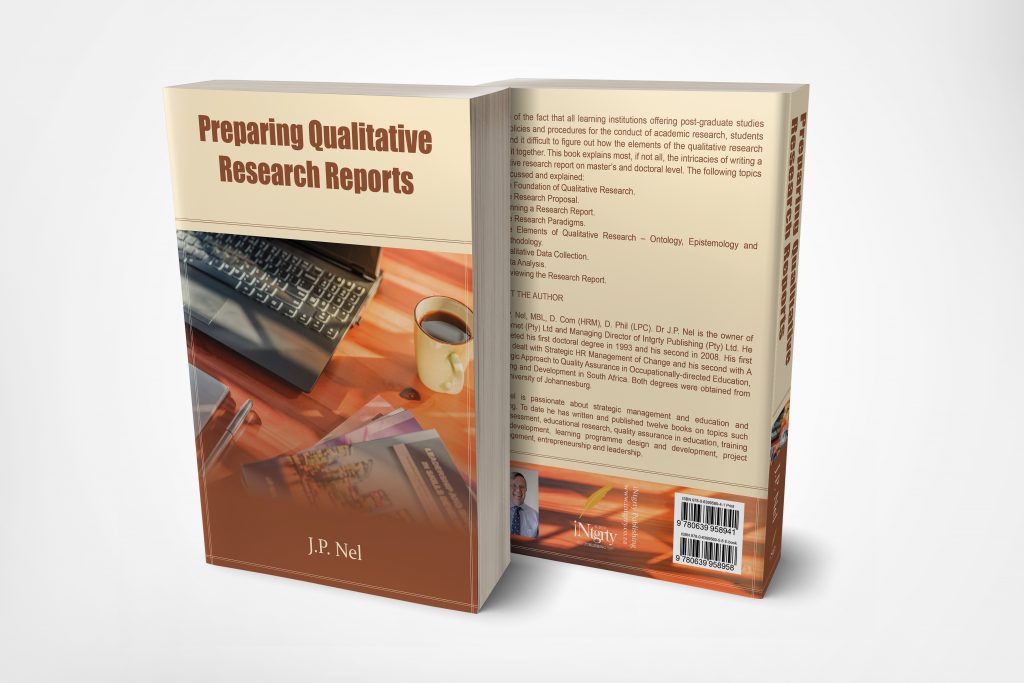Written by Dr. Hannes Nel, MBL; D. Com; D. Phil

Post-modernism gradually became popular from the 1950s onwards. Instead of relying on one approach to knowing, post-modernists support a pluralistic epistemology which utilises multiple ways of knowing. Post-modernism is more than just a philosophical movement or school of thought based on a definite point of view, value system or goal. It is applied mainly in the artistic and social sciences, although it has also gained acceptance in other fields of learning, for example, economics, architecture, etc. Different from modernism, which is technicist in nature, post-modernism is critical but also interpretive.
Post-modernism regards knowledge as fundamentally fragmented and unstable. It rejects the possibility that we can have objective knowledge. Any research should question the validity and accuracy of current knowledge, and the paradigms that are used with research methods should be articulated to the manner in which this is achieved.
Post-modernism questions the existing knowledge upon which we base our thinking and deconstructs this to convey a different way of interpretation and reality. Narratives of truth and knowledge, text or written content, previous authority sources of power, for example, the church and government are deconstructed. Language is fluid and arbitrary and rooted in power or knowledge relations. Meaning is, therefore, vague and the result of deconstruction without scientific proof. Following on from this reasoning, post-modernists caution that we should be careful with generalisations, seeing that events and phenomena are mostly only true in a particular context or point in time or both.
Post-modernism values the subjective and multiple opinions of individuals and communities rather than predetermined rules for action. It assigns value to multiple meanings rather than the single, authoritative voice of the expert researcher. This is because what we call knowledge has to be made with the linguistic and other meaning-making resources of a particular culture, and different cultures can see the world in different ways.
All knowledge of reality bears the mark of human culture, personality and biology, and these cannot be separated from what a specific group of people or culture would call knowledge or truth. Post-modernism argues that what we call knowledge is a special kind of story that puts together words and images in ways that portray the perspective of a particular culture or some relatively powerful members of that culture.
According to post-modernists universal, objective truth does not exist. All judgements of truth exist within a cultural context. This is sometimes also called “cultural relativism”. Stated differently, our endeavour is not to find absolute truth or facts, but the best approximation of truth as it applies to a specific group in a specific situation and a specific time. This does not mean that just anything can be accepted as truth.
Post-modernists reject the idea of a fixed, universal and eternal foundation to reality. They argue that because reality is in part culturally dependent and culture changes over time and varies from community to community, we can logically assume that reality is not the same for everybody. In addition, it is asserted that we construct reality in accordance with our needs, interests, prejudices and cultural traditions.
Because power is distrusted, post-modernists try to set up a less hierarchical approach in which authority sources are more diffuse. The knowledge that we construct refers more to probability than to certainty. It is constantly changing as each individual or group gives a particular interpretation to it, reflecting distinctive needs and experiences. For this reason, we have to deconstruct previous authority sources of power and text to uncover the hidden or intended meanings and discourse.
Facts are seen as temporary and volatile, with the result that they should not be regarded as an only truth. Reality is in part socially constructed with the result that reality is the product of subjective human interpretation with no sharp fact-value distinction. All factual statements reflect the values they serve, and all value beliefs are conditioned by factual assumptions. What we call facts is only somewhat less value-determined, but they are not independent of values.
The idea of a socially constructed reality leads directly to a radical shift in the idea of method. Some post-modernists hold that a research method not only discovers a part of reality, it simultaneously constructs it. No longer do we see ourselves as seeking to uncover a pre-existing reality, but rather as involved in an interactive process of knowledge creation. As researchers, we are part of developing an explanation and understanding of reality and life. What we arrive at is in part autobiographical: it reflects our personal life-story and our interpretation of the meaning of life.
In terms of research, convention is challenged, research approaches are mixed, ambiguity is tolerated, diversity is emphasised, innovation and change are embraced, and multiple realities are focused on. It is a broad term that encompasses many different research methods, most of them valuing uncertainty, disorder, indeterminacy and regression rather than progress.
Post-modernism rejects the emphasis on rational discovery through the scientific method. It replaces rational discovery through scientific research with respect for difference and a celebration of the local at the expense of the universal.
Post-modernism is often associated with post-structuralism. It can include elements of pre-modernism and modernism along with many other ways of knowing, for example, intuition, relational and spiritual. Generally, post-modernism accepts the basic ontological assumption of relativism and claims that there can be no “objective” or final truth as all “truth” is a socially constructed entity. Although post-modernism accepts some elements of modernism, the issue of objective truth is not shared by them.
Reason and science are seen by some as simply myths created by people. It, therefore, rejects the notion that science can be viewed as objective. It consists of a loose alliance of intellectual perspectives which collectively pose a challenging critique of the fundamental premise on which modernism, specifically the scientific research method, is based. Therefore the notion that science, or scientism, is the paradigm of all true knowledge is rejected.
Technicist researchers, favouring paradigms such as scientism and positivism, claim that post-modernism questions existing knowledge on account of opinions, perceptions and presuppositions that are not corroborated by substantial and authoritative evidence. This, they feel, renders research, making use of the post-modernist paradigm, unscientific. Post-modernism, they feel, is based on an anti-realist, subjective ontology, because the formulation of facts is based on human interpretation.
Even proponents of post-modernism do not always agree on what scientific research really means. There are progressive and conservative post-modernists. Some post-modernists seek reaction while others seek resistance. Then there are those who strive for reform and others who like to disrupt the status quo. All post-modernists do not agree to the claim that reality is a human construct.
Not all researchers support the idea of post-modernism. According to the opponents of post-modernism, the approach is too tentative, too inconclusive and too frivolous. Some academics feel that post-modernism adds nothing to analytical or empirical knowledge because it is not based on any principles and supports no consistent and new theories. While some regard post-modernism as not sufficiently objective, there are also those who feel that it is not sufficiently flexible.
The ability of post-modernism to generate truth is questioned because, like any research, findings need to be reported. Post-modernists are of the opinion that the use of language (to write research reports) damages the accuracy of what is shared because language cannot relate reality accurately.
This is the last article on research paradigms that I will post because for the remainder of the year I will be occupied elsewhere. My book, entitled “Preparing Qualitative Research Reports” has now been published. The chapter on research paradigms discusses the nineteen articles that I posted to date as well as nine others. Together they constitute one of eleven chapters. The book is structured in such a manner that post-graduate students studying towards a master’s or doctoral degree can save themselves lots of time and effort by following the sequence of the book while writing their research reports. Additional information on how to order copies can be found at www.mentornet.co.za or www.intgrty.co.za.




